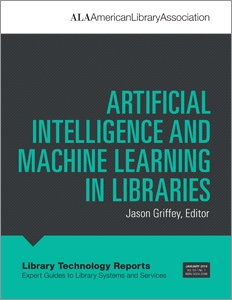Primary tabs
You don't need to be an ALA Member to purchase from the ALA Store, but you'll be asked to create an online account/profile during checkout to proceed. This Web Account is for both Members and non-Members. Note that your ALA Member discount will be applied at the final step of the checkout process.
If you are Tax-Exempt, please verify that your account is currently set up as exempt before placing your order, as our new fulfillment center will need current documentation. Learn how to verify here.
- Description
- Table of Contents
- About the authors
This issue of Library Technology Reports argues that the near future of library work will be enormously impacted and perhaps forever changed as a result of artificial intelligence (AI) and machine learning systems becoming commonplace. It will do so through both essays on theory and predictions of the future of these systems in libraries and also through essays on current events and systems currently being developed in and by libraries. A variety of librarians will discuss their own AI and machine learning projects, how they implemented AI and to what ends, and what they see as useful for the future of libraries in considering AI systems and services. First up is an essay relating the development and design of a machine learning system developed by a library and deployed to production in a library anywhere in the US. The system is HAMLET (How about Machine Learning Enhanced Theses) by Andromeda Yelton, currently a developer at the Berkman Klein Center for Internet and Society at Harvard. At MIT, she created and developed HAMLET. Next, in chapter three, we have an essay by Bohyun Kim, CTO and associate professor at the University of Rhode Island Libraries, where she discusses the launch of their Artificial Intelligence Lab, which is housed in the library on campus. Then in chapter four, Craig Boman, Discovery Services Librarian and assistant librarian at Miami University Libraries, looks at his attempts to use a type of machine learning to build a system to assign formal subject headings to unclassified, full-text works. This report will conclude with a discussion of possibilities and potentials for using AI in libraries and library science.
Chapter 1 Introduction
Jason Griffey
Chapter 2 HAMLET: Neural-Net-Powered Prototypes for Library Discovery
Andromeda Yelton
Chapter 3 AI and Creating the First Multidisciplinary AI Lab
Bohyun Kim
Chapter 4 An Exploration of Machine Learning in Libraries
Craig Boman
Chapter 5 Conclusion
Jason Griffey
Chapter 6 Sources Consulted
Jason Griffey
Jason Griffey is a librarian, technologist, consultant, writer, and speaker. He is the founder and principal at Evenly Distributed, a technology consulting and creation firm for libraries, museums, educational institutions, and other nonprofits. Griffey is an Affiliate researcher at metaLAB at Harvard University, and a former Fellow at the Berkman Klein Center for Internet and Society at Harvard University. He was a winner of the Knight Foundation News Challenge for Libraries in 2015 for the Measure the Future project, an open hardware project designed to provide actionable use metrics for library spaces. Griffey is also the creator and director of the LibraryBox Project, an open-source portable digital file distribution system. He has written and spoken internationally on topics such as the future of technology and libraries, personal electronics in the library, privacy, copyright, and intellectual property.
Library Technology Reports
Published by ALA TechSource, Library Technology Reports helps librarians make informed decisions about technology products and projects. Library Technology Reports publishes eight issues annually and provides thorough overviews of current technology. Reports are authored by experts in the field and may address the application of technology to library services, offer evaluative descriptions of specific products or product classes, or cover emerging technology. Find out more information on this publication here.



